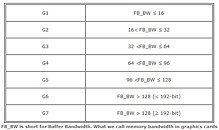Sunday, October 14th 2012
New EU Energy Guidelines Could Cripple High-End Graphics Cards
One of the biggest consumer electronics markets, EU strictly regulates materials, radio-emissions, and energy-efficiency of consumer electronics items eligible for sale in its member states. A new such energy-efficiency regulation is taking shape that specifically mandates integrated graphics cores and discrete graphics cards to live up to certain energy standards. This has GPU maker AMD worried that it could affect next-generation chips, as they could be barred from sales in the EU.
The EU classifies graphics cards on the basis of on-board memory bandwidth, which is a reliable means of segregating the various market segments. The various classes are tabled below. The top tier "G7" is classified as graphics cards with 128 GB/s or above memory bandwidth. EU wants to cap graphics cards from achieving bandwidths above 320 GB/s (possible with 6.67 GHz at 384-bit width, or 5.00 GHz at 512-bit width). The EU sees memory bandwidth as proportionate to power-consumption. It's possible that the EU sees today's hardware more than sufficiently fast to handle games, and every new generation that increases performance does so with increases in power-consumption. With the sheer size of the EU market, GPU makers could be deterred from making low-volume high-performance products for the rest of the world as well.
Source:
NordicHardware
The EU classifies graphics cards on the basis of on-board memory bandwidth, which is a reliable means of segregating the various market segments. The various classes are tabled below. The top tier "G7" is classified as graphics cards with 128 GB/s or above memory bandwidth. EU wants to cap graphics cards from achieving bandwidths above 320 GB/s (possible with 6.67 GHz at 384-bit width, or 5.00 GHz at 512-bit width). The EU sees memory bandwidth as proportionate to power-consumption. It's possible that the EU sees today's hardware more than sufficiently fast to handle games, and every new generation that increases performance does so with increases in power-consumption. With the sheer size of the EU market, GPU makers could be deterred from making low-volume high-performance products for the rest of the world as well.

35 Comments on New EU Energy Guidelines Could Cripple High-End Graphics Cards
:shadedshu:shadedshu:shadedshu
OT,this is a joke.why EU limiting specific object in niche market such a high end graphics card?say 1 out of 10 people having this card,and that will depleted all energy resources in EU?great,now please banned all psu above 750W :wtf:
or it's pushed by nVidia because they couldn't reach that high :p
What bright moron thought of this?
2005.
today's date?
2012.
This idea:
:nutkick:
It is simply refering to updates to this same document, planned to be enacted in the near future, apprantly.
Forcing OEMs to stick within a specific power budget for specfic devices could potentially lead to greater innovation, and then lead to us getting better products.
However, that document needs some serious updates anyway, methinks.
In which case they would all agree to change the standard for measuring power consumption.
let's take the positive side of this news, make a better world for tomorrow
go green :rockout:
I´ll simply buy my cards in the US or Australia ......
The only positive site could be, as stated in posts before, that it will lead to
better innovations...hopefully....
thats like saying we are going to block all sales of CPU's that are clocked higher than 4Ghz cause dats gonna drain da power.... derp
im just failing to see how bandwidth relates to EFFICIENCY, i see how it relates to power draw but not efficiency
Banning the incandescent light bulb makes sense, but this is just odd. Perhaps intel is behind this.
EU doesn't ban sportscars despite their low fuel-efficiency. There's no limit to how powerful a sportscar can get*, most of them are designed and made in the EU.
*there are emission standards but those don't pose a minimum limit for fuel-efficiency to be met.
This also applies to "consumer" products. Nothing said about industrial boards ;)
So limiting gfx cards based on bandwidth (lol?) to make power consumption lower makes no sense.
But this seems especially poorly thought through, because it would effectively gimp technological progress without necessarily having much to do with efficiency. Hopefully it never sees the light of day, or can be campaigned against otherwise.
(Incidentally, I am overall pro-EU, in case I happen to give the opposite impression. The good stuff outweighs the occasional bureaucratic incompetence.)Bandwidth will still present a bottleneck.
Meanwhile the buearocrats run mansions with 5000million lights on, heaters in every room, ten cars per family member, yachts, etc etc etc, what a joke.
Like James May said, they should just buy a bicycle company to lower the CO2 emissions lol...